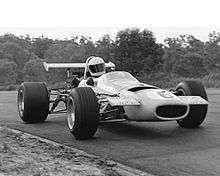Mildren (racing cars)
The Mildren name was used on a series of racing vehicles constructed for, or acquired by, Australian racing team owner Alec Mildren during the 1960s and early 1970s.
Mildren Maserati
The Mildren Maserati was a one-off sports car which was built in 1964, utilizing a clone of a Lotus 19 chassis with components from a Cooper T51 and a 2.9 litre Maserati Type 61 engine.[1] The chassis was constructed by Bob Britton, who also produced racing cars under the Rennmax name.[2] The car was driven to victory in the 1965 Victorian Sports Car Championship by Kevin Bartlett.[3] It was also favoured to win the 1965 Australian Tourist Trophy [4] in the hands of Frank Gardner, but it failed to start the race after an engine failure in a preliminary heat.[5]
The Mildren Maserati was sold to Tasmanian Ross Ambrose in 1966 and was subsequently fitted with a 2.2-litre Coventry Climax engine and raced as the Rennmax-Climax.[1] In 1969 Ambrose had the car re-engined with a 4.4 litre Traco-Oldsmobile powerplant and then race it as the Traco-Rennmax.[1]
Mildren Waggott (Rennmax BN3)

The Mildren Waggott was a space frame [6] open wheeler racing car built by Bob Britton for Alec Mildren Racing, as one of a number of cars built to the Rennmax BN3 design, which itself was derived from the Brabham BT23.[7] Originally powered by a 1.6 litre Alfa Romeo engine, the car was driven by Max Stewart in the 1969 Tasman Series and was subsequently fitted with a 1.6 litre Waggott.[7] Stewart drove the car to victory in the 1969 Australian Formula 2 Championship, the 1970 Australian Formula 2 Championship and the 1971 Australian Drivers' Championship,[8] with a 2.0 litre Waggott engine being used to win the third title.[9]
Mildren Mono
The Mildren Mono was a monocoque open wheeler racing car which was designed by Len Bailey and built by Alan Mann Racing.[10] The car debuted in 1968 at Warwick Farm Raceway in the hands of Frank Gardner, powered by a 2.5 litre Alfa Romeo V8 engine.[10] Kevin Bartlett drove the car to victory in the 1969 Australian Drivers' Championship utilizing the Alfa Romeo engine and 4 cylinder, four valve per cylinder Waggott engines of 1850cc and 2 litre capacity.[10]
The Mono was later raced as a Ford powered Australian Formula 2 car by Ray Winter,[11] finishing third in the rain-effected 1975 Australian Grand Prix at Surfers Paradise against a field composed primarily of "Formula 5000" cars.[12]
The car was commonly referred to as the "Yellow Submarine",[10] due to the Mildren team cars generally being painted yellow.
Mildren Chevrolet
The Mildren Chevrolet was a Chevrolet powered monocoque Formula 5000 racing car, designed by Len Bailey with assistance from Frank Gardner.[13] The car was driven by Kevin Bartlett in the 1970 Australian Grand Prix, but failed to finish.[14] It was also driven by Bartlett in the 1971 Tasman Series, with Bartlett placing seventh in that series.[13]
References
- 1 2 3 Rennmax, www.oldracingcars.com Retrieved on 15 December 2012
- ↑ Alec Mildren Rennmax Maserati, www.motorsportarchive.com Retrieved on 15 December 2012
- ↑ Sandown Park, Australian Motor Sports and Automobiles, November 1965, page 46
- ↑ Mildren Maserati, Motor Racing Australia, No 100, October / November 2007, page 54
- ↑ Australian TT 1965, www.racingsportscars.com Retrieved on 15 December 2012
- ↑ Australian Gold Star 1969, www.oldracingcars.com Retrieved on 15 December 2012
- 1 2 Rennmax BN3, www.oldracingcars.com Retrieved on 15 December 2012
- ↑ Mildren Waggott information board image, www.flickr.com Retrieved on 15 December 2012
- ↑ John Brownsea, Stewart is 'Gold Star' Champ, Racing Car News, November 1971, page 58
- 1 2 3 4 Old Gold, Racing Car News, May 1989, pages 88 to 91
- ↑ Mildren Yellow Submarine, Motor Racing Australia No 100, October / November 2007, page 43
- ↑ The official 50-race history of the Australian Grand Prix, pages 388 to 395
- 1 2 1971 Season, www.sergent.com.au Retrieved on 15 December 2012
- ↑ The official 50-race history of the Australian Grand Prix, pages 346 to 352